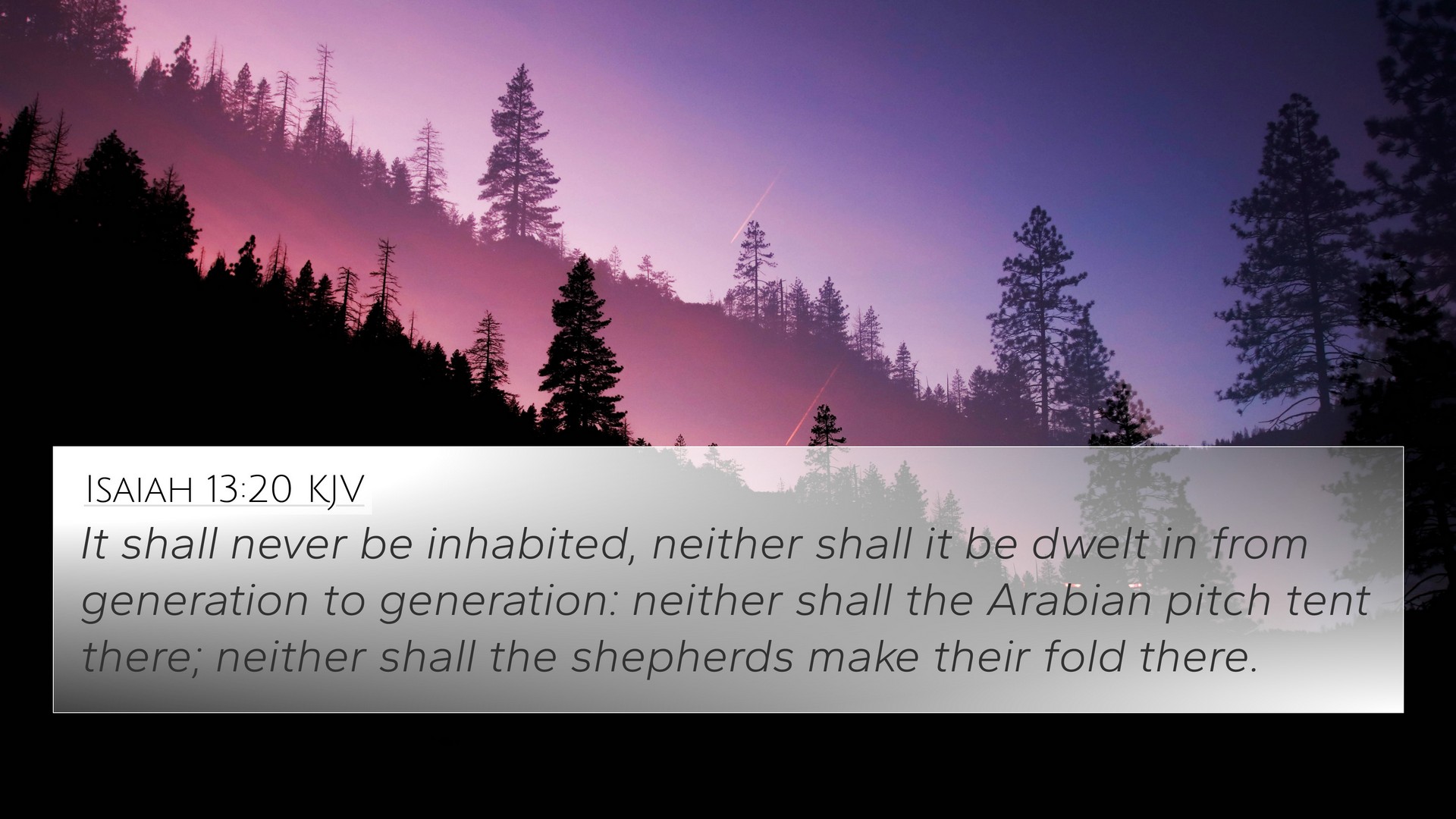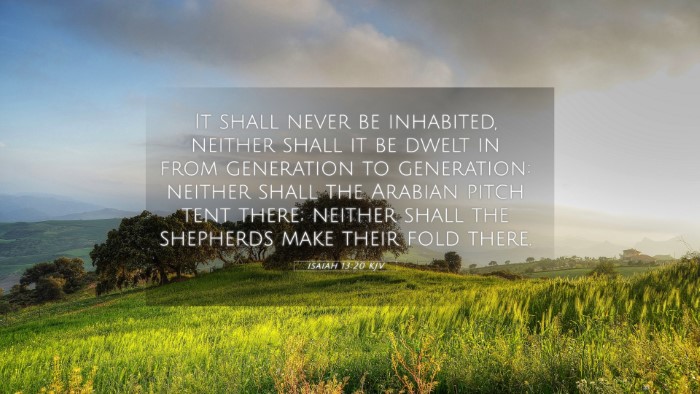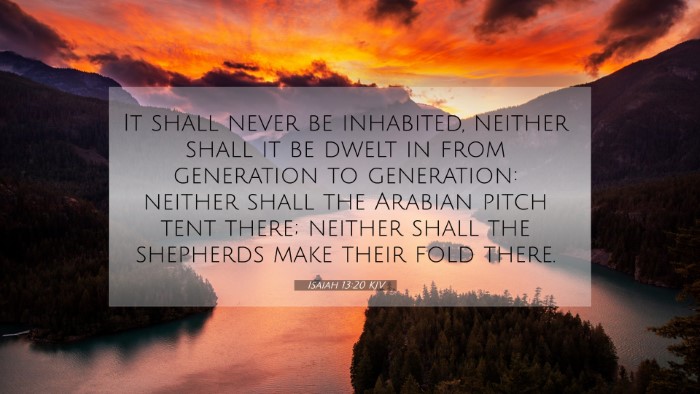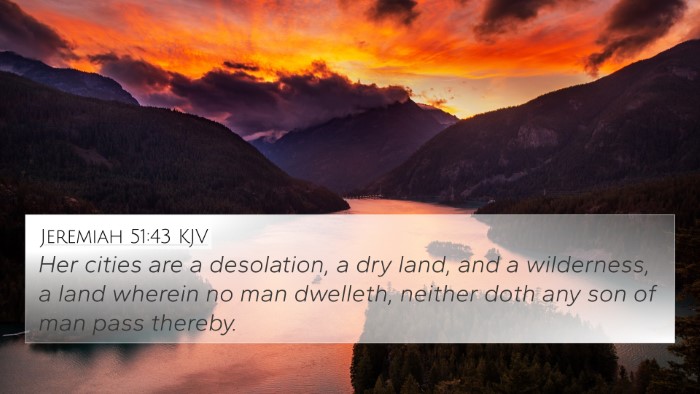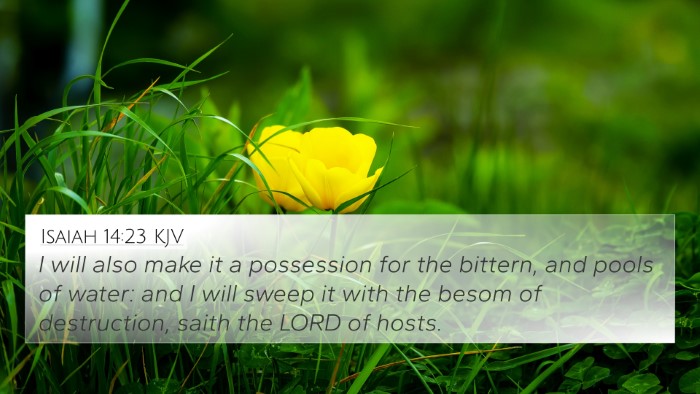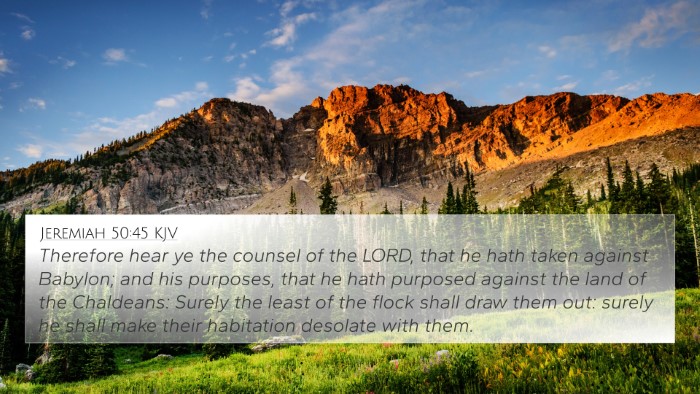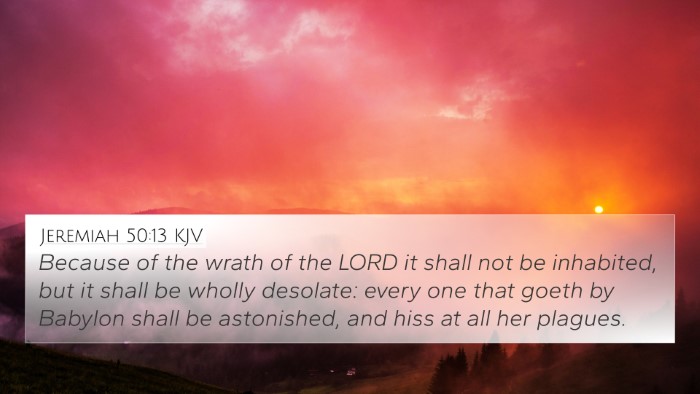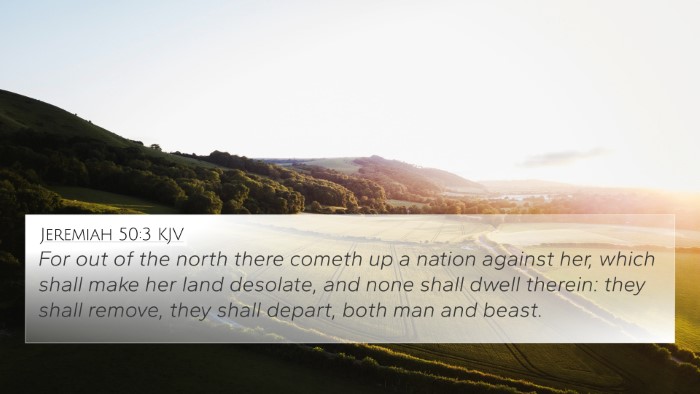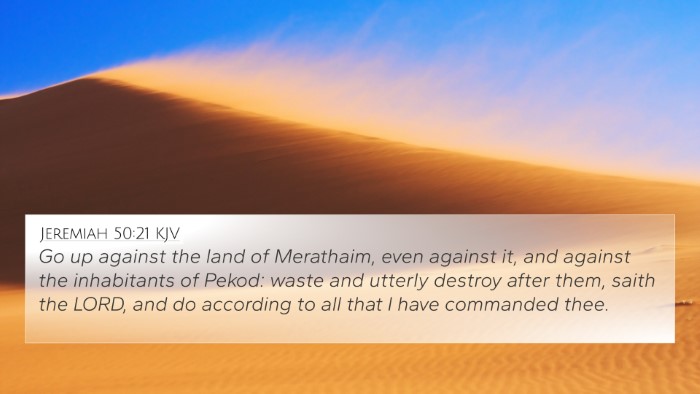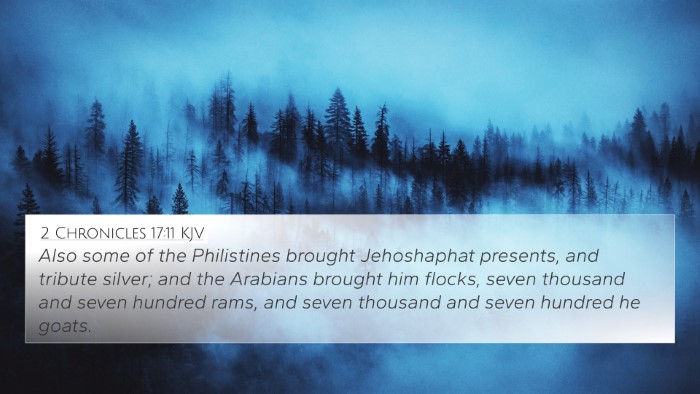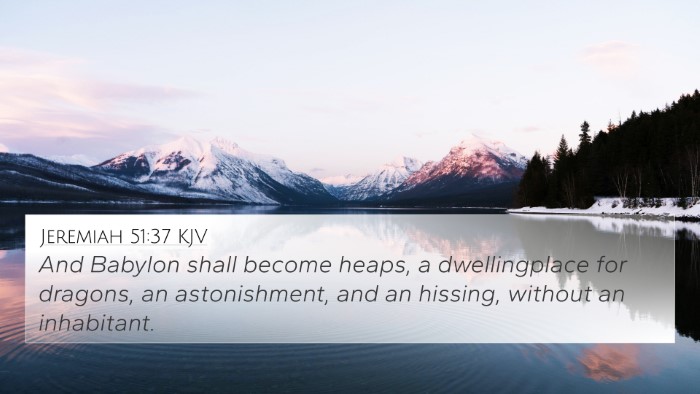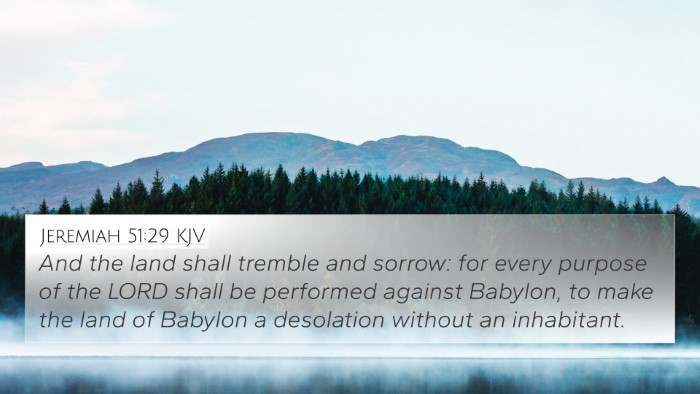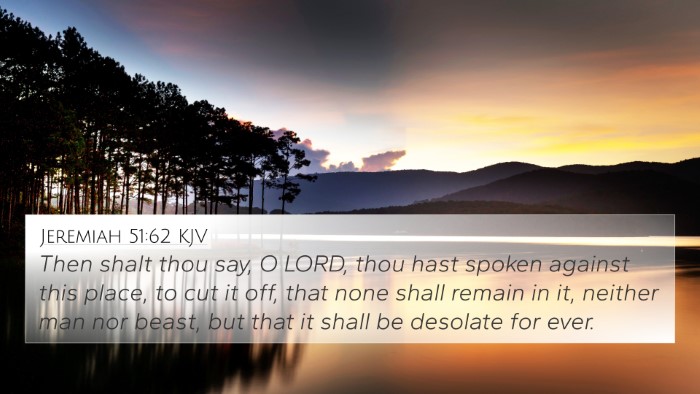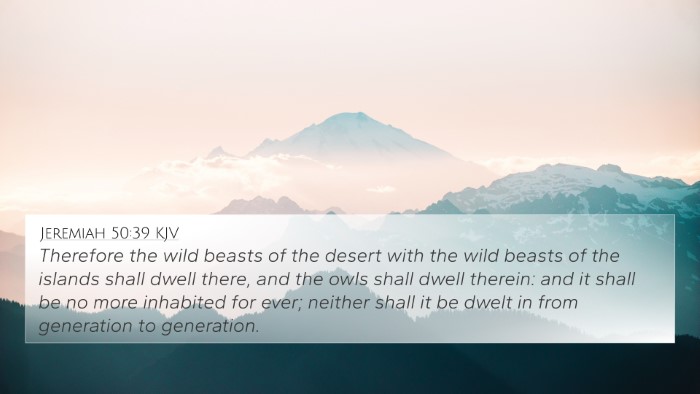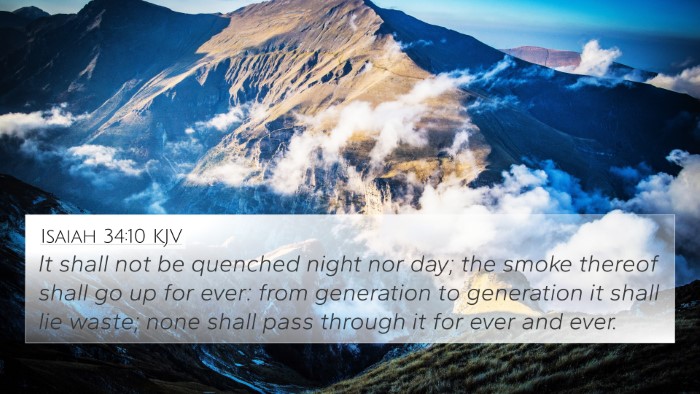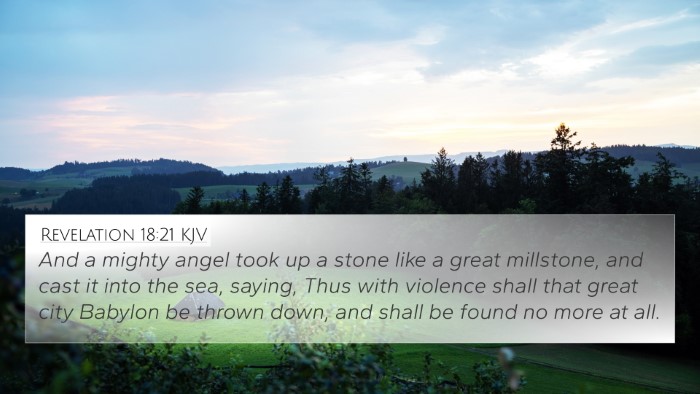Understanding Isaiah 13:20
Verse: Isaiah 13:20 - "It shall never be inhabited, neither shall it be dwelt in from generation to generation: neither shall the Arabian pitch tent there; neither shall the shepherds make their fold there."
Context and Overview
This verse is part of a prophecy concerning the destruction of Babylon, a city known for its great wealth and power, but also for its idolatry and opposition to God’s people. The prophet Isaiah spoke these words to convey the finality of the judgment against Babylon, illustrating a desolate future where it would not recover from its destruction.
Commentary Insights
- Matthew Henry: Henry emphasizes the absolute nature of the judgment, indicating that Babylon would be reduced to a state where no life, whether human or animal, could sustain itself. He notes the contrast between the glory of Babylon and its ultimate desolation.
- Albert Barnes: Barnes elaborates on the implications of "never be inhabited," suggesting that this serves as a warning to all nations against pride and arrogance. He highlights the certainty of destruction as a divine decree, underscoring the theme of divine justice.
- Adam Clarke: Clarke discusses the prophetic nature of Isaiah’s words, interpreting the desolation of Babylon not only in a literal sense but also as a moral lesson on the consequences of turning away from God. He reflects on the strong symbolism of shepherds and Arabian tents not being found, representing a complete cessation of life and commerce.
Thematic Bible Verse Connections
This verse connects to several themes within scripture, such as judgment, desolation, and divine justice. It serves as a reminder of God’s sovereignty over nations and the transient nature of human achievements.
Cross-References
- Revelation 18:2: "And he cried mightily with a strong voice, saying, Babylon the great is fallen, is fallen, and is become the habitation of devils, and the hold of every foul spirit."
- Jeremiah 51:26: "And they shall not take of thee a stone for a corner, nor a stone for foundations; but thou shalt be desolate for ever, saith the LORD."
- Isaiah 34:10: "It shall not be quenched night nor day; the smoke thereof shall go up for ever: from generation to generation it shall lie waste; none shall pass through it for ever and ever."
- Zephaniah 2:15: "This is the rejoicing city that dwelt carelessly, that said in her heart, I am, and there is none beside me: how is she become a desolation, a place for beasts to lie down in!"
- Micah 5:6: "And they shall waste the land of Assyria with the sword, and the land of Nimrod in the entrances thereof: thus shall he deliver us from the Assyrian, when he cometh into our land, and when he treadeth within our borders."
- Isaiah 14:23: "I will also make it a possession for the bittern, and pools of water: and I will sweep it with the besom of destruction, saith the LORD of hosts."
- Isaiah 24:10: "The city of confusion is broken down: every house is shut up, that no man may come in."
- Matthew 12:25: "And Jesus knew their thoughts, and said unto them, Every kingdom divided against itself is brought to desolation; and every city or house divided against itself shall not stand."
- Micah 1:6: "Therefore I will make Samaria as an heap of the field, and as plants of a vineyard: and I will pour down the stones thereof into the valley, and I will discover the foundations thereof."
- Isaiah 47:1: "Come down, and sit in the dust, O virgin daughter of Babylon, sit on the ground: there is no throne, O daughter of the Chaldeans: for thou shalt no more be called tender and delicate."
Comparative Bible Verse Analysis
Analyzing Isaiah 13:20 alongside its cross-references reveals critical insights into God's judgment. Each referenced verse offers a deeper understanding of the absolute nature of God's decrees and the implications for nations and individuals alike. In correlating these passages, we see a consistent theme of divine retribution against pride and oppression.
Conclusion
Isaiah 13:20 serves as a powerful reminder of the fate awaiting those who stand against God. Through various commentaries, we understand this desolation not merely as physical ruin but as a stark warning of spiritual consequences. The repeated emphasis throughout scriptures on God's sovereignty and justice calls believers to reflect on the nature of their actions in light of divine truth.
Tools for Bible Cross-Referencing
Engaging with the text through tools like a Bible concordance or a Bible cross-reference guide allows individuals to discover related verses that enhance understanding and facilitate a deeper study experience. The cross-reference Bible study methods can enrich personal spiritual journeys by illuminating connections between biblical themes.
Call to Action
To fully appreciate the richness of scripture, explore the links between prophets and apostolic teachings, and utilize resources for comprehensive Bible cross-reference materials that guide you in your study. Understanding the connections in the Bible not only enriches one’s faith but also fosters a greater appreciation for the living Word.
